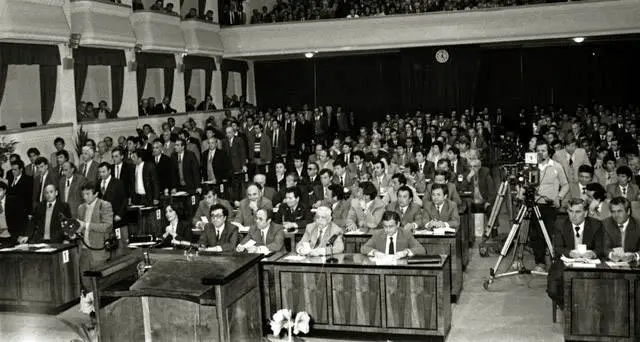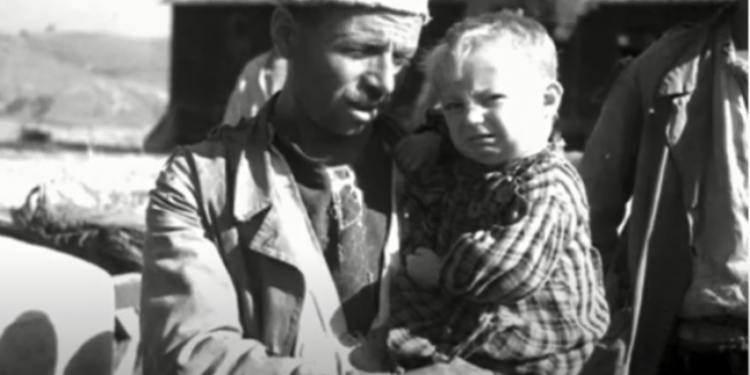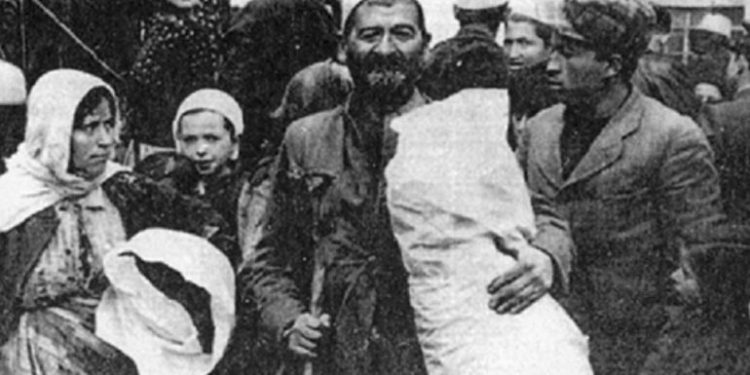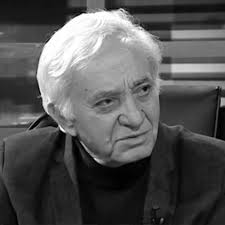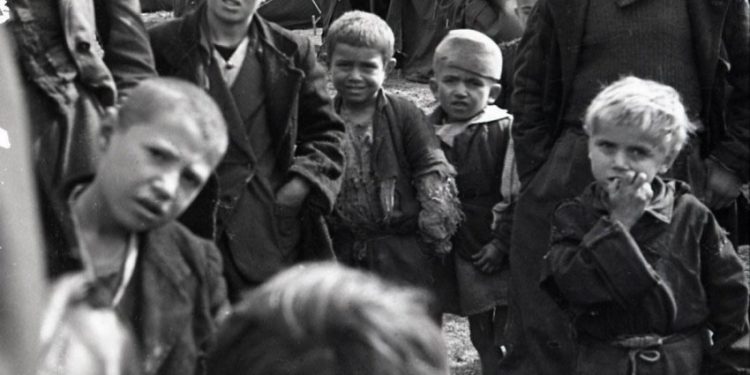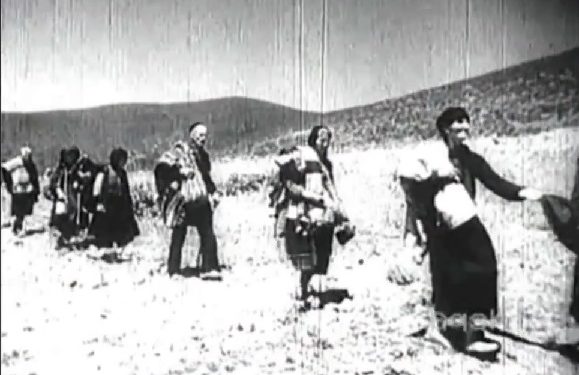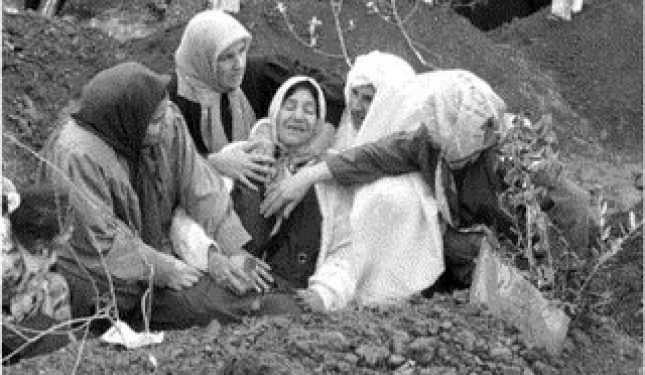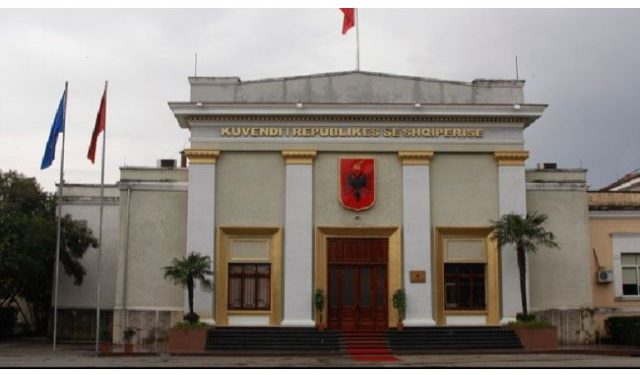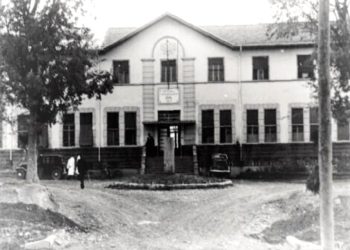Dashnor Kaloçi
Memorie.al publishes for the first time some parts of the parliamentary session of June 30, 1994, when the People’s Assembly, in full unanimity, decided that June 27, be included in the national calendar, as’ Day of genocide against the Albanians of Chameria by Greek chauvinism ‘. Who was the MP who first took the initiative to adopt that resolution and some of the discussions of other MPs such as: Halit Shamata, Mendu Dërguti, Ihsan Çabej, Sadik Bejko, Moikom Zeqo, etc., who with historical arguments and facts highlighted the massacres of Greek chauvinists towards Chameria, for nearly a century. The resolution in question at that time found support and was signed by a group of other MPs, such as: Azem Hajdari, Vasil Gjika, Shaban Memia, Pjetër Pepa, Ibrahim Vasjari, Gëzim Luli, Mitro Çela, Lindita Prifti, Esat Çoku, Afrim Jupi, Natasha Shehu, Uran Butka, Ihsan Çabej, Tomorr Malasi, Moikom Zerqo, Tonin Ujka, Blerim Çela, Kujtim Gina, Halit Shamata, Kol Tonaj etc.
Full 27 years ago, on June 30, 1994, during a plenary session, the People’s Assembly of Albania decided with full unanimity that June 27, be included in the national calendar as ‘Day of the genocide against the Albanians of Chameria by Greek chauvinism’. That initiative was taken by the deputy Abedin Elmazi (of Cham origin) and found support and was signed by a group of other deputies, such as: Azem Hajdari, Vasil Gjika, Shaban Memia, Pjetër Pepa, Ibrahim Vasjari, Menduh Dërguti, Gëzim Luli, Mitro Çela, Lindita Prifti, Esat Çoku, Afrim Jupi, Natasha Shehu, Uran Butka, Ihsan Çabej, Tomorr Malasi, Moikom Zerqo, Tonin Ujka, Blerim Çela, Kujtim Gina, Halit Shamata, Kol Tonaj etc. From their discussions, we have selected those of Halit Shamata, Ihsan Çabej, Mendu Dërguti, Moikom Zeqo and Sadik Bejko, parts of which we are publishing in this article.
Speech of MP Halit Shamata
“The Cham tragedy or the Albanian masked Holocaust, not coincidentally in the oblivion of 59 years of dictatorship, is still an open issue and, as such, leaves open many issues that deal with the entire international problem. It always represents and aims to be a national memorandum and even further, to cut off any violence and anti-Albanian and anti-human chauvinist stance, in the name of peace and good neighborliness. The content and approval of this project represent a double memorial for one of the greatest tragedies and worries of Albanians stretched across the dimension of the century with which we are preparing to part “.
The speech of the deputy Menduh Dërguti
“The Cham population became an Albanian minority within the Greek state after the unjust decisions taken by the great powers regarding the southern border of Albania in 1913, an area which was separated from the mother territory and passed as territory within the Greek state. Chameria, which constituted Southern or Lower Albania, has always been inhabited by Albanians and starting from the Roman occupation and later, the Byzantine and Turkish, it has never had substantial changes in its ethnic composition. The documents that shed light on these centuries-old historical facts are numerous. Let me recall any of them, as time does not allow me to make a full presentation of the problem. Strabo, speaking of the language of Ambrahia, emphasized that for those who enter by boat into this mouth of the sea, on the right are the Akranans who are Greeks, on the left is Nicopolis and Castiole who are Epiriots. Gregory the Acropolis, the Byzantine historian and commander-in-chief of the army, claimed, among other things, that the Pindus Mountains separated old and new Epirus from Greek soil. While in the period of Ottoman rule, all the documents that speak of the Vilayet of Ioannina called this area Arnautllëk. The Ottoman Turks, after the conquest of Ioannina in 1431, examined its territory and classified it, as Konica claims, a part of Albania. The data coming out of the Ottoman administration registers are very significant and indisputable, where not only the existence of the Albanian population is proved, but also the names of places, cities, villages, in general the toponymy and anthroponymy of these official registers is expressed in pure Albanian forms and not Greek. I think that during this long historical period, where in general the fate of the two oldest peoples of the Balkans has been the same, with common good and bad, friendship and cooperation have expressed a necessity. As many foreign and Greek scholars have stated, the presence of the Albanian factor in the history of Greek society has been of capital importance. Today’s Arvanite enclaves, created since the Middle Ages, have given abundantly their blood, sweat, mind for freedom, development and progress of Greek society without mentioning here the Albanian factor in the Greek revolution of 1822, which in terms of dimension is equivalent to the Greek one. But, just after the victory of the revolution and the creation of the independent Greek state, in 1830, the events take a big turn. The Greek factor, which for the Albanian was a friend in trouble and in the fight for freedom, turns into a very dangerous factor for the Albanian lands. At this time begins the Greek claim for an expansion to the North, ie to extend to Chameria. Such attempts were made in 1854, in 1873 and especially during the Balkan wars of 1912-1913, but it was not possible for Albania to secede from any piece of land. After 1913, began the intense Greek expansion carried out by reactionary chauvinist circles that occasionally impose on state forces the implementation of an anti-Albanian, anti-democratic and inhumane policy, which escalated into the character of criminal campaigns aimed at complete ethnic cleansing of the Cham population. This organized crime, which operated for 32 years, until 1945, was committed by the most inhumane means such as: murder, imprisonment, deportation, internment, robbery, burning, rape, mass massacres, as evidenced by many foreigners who eyewitnesses were present during these ugly and inhumane events. This horror began on February 23, 1913 in Paramithi, with the massacre of 72 men. After World War I, the Greek government decided to send the Cham Muslim population to Turkey, replacing them with Greek emigrants from Asia Minor. It was the League of Nations, which after determining the Albanian nationality in Chameria, rejected the decision of the Greek government. The culmination of the Cham massacre reached the years of the Anti-Fascist War, when the terrorist forces of Napoleon Zerva, Theodhoiri Vitos, etc., began mass persecution, entire families disappeared, women and girls were dishonored, old men and children were shot, villages and towns were burned, a real massacre that ended in 1944-1945 with the expulsion of 23,000 Chams who took refuge in Albania, ending the Cham displacement and their ethnic extermination. As a sign of respect for our Cham brothers, who were martyred in defense of their Albanian identity, we as a commission agree that June 27 be declared in the national calendar as the day of genocide against the Albanians of Chameria by Greek chauvinism and be raised in Konispol near the martyred lands of Chameria a memorial. With this act, we are convinced that we are fulfilling a task, a moral debt to the martyred Cham population, we are taking a step forward in re-evaluating history, we are still shedding light on the anti-national policy of the red dictatorship that left the Cham tragedy in oblivion, even and bury it, and finally, by institutionalizing the Cham massacre, we raise the Cham problem as an aspect of our national cause, which within the democratic norms of freedoms and human rights will find its solution. “Thus, the Greek minority and the Cham problem and their treatment within the democratic dimensions will be transformed into stable bridges of interstate friendship and cooperation, following in the footsteps of the historical tradition of good neighborliness and mutual assistance.”
The speech of the deputy Ihsan Çabej
“There is no greater, more painful and sadder tragedy when a mother remembers the loss of her child. It is about the annihilating tragedy suffered by the southern province, Chameria, whose origin they want to deny. There are historians who want to prove that the Balkans in ancient times was called the Illyrian Penisola, or the Illyrian Peninsula, inhabited mainly by Illyrian tribes, for whom it has been conclusively proven that they are our ancestors. So, apparently, our ancestors were the early inhabitants of these territories stretching along the Adriatic and Ionian coasts, the latter called by the Greeks Epirus, meaning continent, because they were mainly concentrated on the islands. The Greek classics themselves describe their northern border at Thermopylae. But over the centuries, the Greek pushed step by step toward the North on the continent and the Illyrian tribes came slowly retreating. Cunning came out more victorious over bravery. The Romans conquered the peninsula and Roman rule was followed by Byzantine rule. In the 6th-7th century BC, the Asian Slavic barbarians flocked here, who today claim the absurd paradox that the Kosovo of the Illyrian Dardanians, coming to these territories from generation to generation since antiquity, is the cradle of Slavism. In the 15th century, the peninsula was conquered by the Ottoman hordes, but in the meantime, Byzantium had sown the seeds of orthodoxy and Hellenization to a considerable extent throughout the South of the peninsula, and this path was not interrupted by the invaders, who was interested in a deeper and tougher vision of the Church of Constantinople with that of Rome. To this end, the High Gate established the Patriarchate in Istanbul, which it left to administer all the Christians of the region. The privileges bestowed on the first patriarch, Geradios, were inherited by his descendants. The patriarchate strictly carried out the orders of the wealthy Greek Greeks of Istanbul’s Fanar district, so that the Greeks were given all the conditions to occupy the entire southern part of the peninsula and to Hellenize other provinces not their own. At the same time, Constantinople became an attractive alternative for all the inhabitants of the Balkans, and in the 18th century, the Albanian, caught between two fires: between the barbarian Serbs in the North and the predatory Greeks in the South, was forced to embrace Islam in order to win political credit and escape extinction.
Speech of the deputy Sadik Bejko
The massacres should be spoken of simply and seriously, as in the days when we commemorate national mourning and calamities. To talk about this does not mean to talk about nationalism. To me, patriotism and nationalism are completely different things. Albania has a map, a geography of massacres and purges that surround it on all four sides, across its borders. It should also have books of massacres and their memorials. Extermination has been promoted by wars, burns, famines, in the spread of mass diseases such as plague, there are old and new massacres like that of Manastir, Tivar, Nis, Chameria, etc. The massacres were driven by a war of culture, Ottomanism, Serbization, Montenegrin conversion and Hellenization. There is a whole Albanian killer science. There are scientists and memoranda, with thick books, there are clerics who have used religion in the service of assimilation, then gangs of executioners, even the invading and exterminating armies. Our borders carry the smell of ashes and burnt flesh for human life. We are a nation still divided into five states. In this sense, the Cham massacre of June 27, 1944 is opposed to the ancient tragedy of the Albanians, but it was a continuation of many massacres. The Chams experienced expulsions, even Andallagian exchanges. Then Chameria, finally, experienced the blackest tragedy, ethnic cleansing, is a crime that was incited with all the black colors of crime, a classic crime and ethnic cleansing, in the spirit that brought World War II with fascist philosophy for the extinction of races, for the burning for the living, the absolute annihilation of the races we do not love. Such an expansion of borders with the eventual annihilation of another culture cannot be overshadowed by the fact that the Chams were once collaborators of fascism.
The word of the deputy Moikom Zeqo: Here is the truth of the Parimithia massacre
In the session of the People’s Assembly of 30.06.1994, where many deputies in their speech highlighted the massacres of Greeks against the Albanian Muslim population of Chameria, MP Dr. Moikom Zeqo, a well-known scholar and historian, said, among other things: “Historical events and facts in themselves infinitely preserve their autonomy, they cannot be erased and constitute the indelible matter of national memory, memory which has to do with our dignity, freedom and individuality over the centuries. In this sense, it is completely right and national obligation to commemorate June 27, 1944 as the day of the genocide against the Albanians of Chameria by Greek chauvinism and to erect a memorial in Konispol. The Cham issue is a very painful dimension of the Albanian national tragedy. It is unbelievable, so it is: the Chams, an ancient indigenous Albanian population, one of the noblest and most talented, one of the most persecuted of our nation and undoubtedly of the whole Balkans, with an unusual and amazing folklore, and pure vitality, have been subjected to genocide several times. The genocide that started on June 27, 1944, 51 years ago in the martyred city of Paramithia, where 701 men and 212 women and children were killed in one day, the continuation of the Parga massacre on August 28, 1944, where 200 people disappeared , in Filat and Vanar where hundreds of other innocent people suffered, the forced displacement from their lands is the inferential masterpiece of the chauvinist gangs of the infamous general Napoleon Zerva and constitute a night of St. Bartholomew for the Albanians. “This genocide was the first ethnic cleansing at the end of World War II in Europe.”
The word of the deputy Abedin Elmazi, originally from Chameria: “The Greeks took the children out of the mother’s womb …”!
In his discussion, MP Abedin Elmazi, who was the first to take the initiative to commemorate the Greek genocide against the Albanian Muslim population of Chameria, said among other things: “We are discussing one of the most painful aspects of our national tragedy, the last tragedy of the Muslim population of Chameria, after a long silence of the communist dictatorship, which abandoned the rights and the glorious history of this population, as it did for our entire national problem. I thank the group of deputies, who supported the proposals made by me in the statement I made three weeks ago in parliament, presenting them in the form of a draft law. I also thank the Presidency of the People’s Assembly and those of the participating parliamentary groups, who put on the agenda with priority the historical assessment of the unparalleled resistance of the Albanian brothers of Chameria, who were martyred in defense of their Albanian identity and being. The day of June 27, 1944 remains in the history of the Albanian people as one of its most painful days. It also remains one of the darkest days in the history of Albanian-Greek relations, one of the most typical evidence of the many injustices done to the Albanian nation. After exterminations, constant persecutions, denial of all rights, as ethnic and autochthonous population unjustly left under Greek rule by the great powers in 1913, Chameria and its Albanian population of the Islamic faith, became the end of World War II victims of an unprecedented ethnic cleansing. This act, committed by the criminal gangs of the most furious Greek chauvinism led by General Napoleon Zerva, was treacherous and lightning fast. It was a continuation of a savage genocide that began in 1913 against the innocent ethnic and autochthonous population, completely defenseless, who had exemplaryly resisted the Hellenizing storms for centuries, was one of the most inhumane and of the greatest proportions since history has known, it was unique “. Memorie.al




